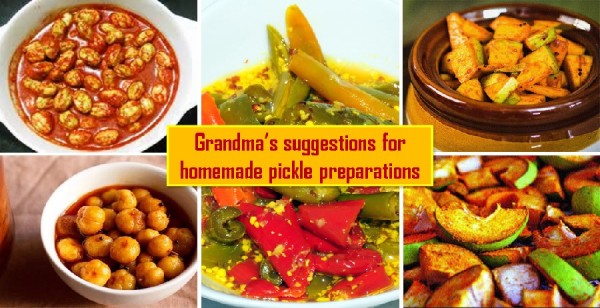
Preparing pickles? See what grandma has to say
Traditional Indian pickles are spicy, tasty and strong. There are many varieties of pickles one can prepare (see here). Main ingredients such as different varieties of mangoes, lemon, lime, vegetables, herbs and roots – ginger, turmeric, hemidesmus give unique taste to pickles. Remaining ingredients are almost same in most Indian spicy pickles. Turmeric, fenugreek, asafetida, chilli powder, mustard and salt are the common ingredients. For variation people add green chillis, mustard powder, fennel seeds. Oil is another key ingredient of pickles.
Reason we eat pickle is to enhance taste buds especially when we are sick, to enhance food taste, to add extra spice and it aids digestion.
What are the role of ingredients?
- Turmeric: Gives color to pickle and it has high medicinal property. It helps in digestion and increases metabolism. Moreover, adding turmeric to food improves our overall health.
- Fenugreek: Helps to reduce cholesterol, lowers sugar and improves digestion.
- Asafetida: Reduces stomach pain, gas, bloating and inflammation of digestive system
- Oil: Oil type and quantity varies and depends on pickle type. Two types of oil generally used in pickle are: Sesame oil is important for bone, arthritis and hair growth, mustard oil has several health benefits – hair growth, skin and known to reduce body pain.
Now a day many varieties of ready made pickles or aachar is available in supermarket. Not all brands are good – either the smell is odd, or taste would be stale. Reason for this is, quality of the oil. Oil preserves the pickle for longtime. However, if quality of oil is not good it gives an odd odor to pickle. Other reasons for pickles to go bad or does not taste good is because of quality of materials that goes in – mustard powder, old chillis or chilli powder, improper processing, quick mixing and fixing pickle are few reasons for pickles to go bad. Preparing pickles at home is easy and does not require much effort.
If pickles are made at home there are several precautions one should take -,
Traditionally, pickles are made in air tight containers or jars. Mango, lemon pickles prepared by salting them for at least 15 days and stored in dark places to avoid fungal and bacterial growth. Before putting in salt handpicked mango or lemons are washed thoroughly in water and air dried for several hours to ensure there is no water content. Water retention spoils the pickle as water gives a way for microbial growth. Every alternate day salted content is mixed using dry ladle.
When adding salt or rock salt, make sure it is not impure and there is no water content in it.
- Oil – use suitable oil. Coconut oil, vegetable oil or canola oil does not give good taste for pickle. Best oils are sesame oil, peanut oil or sunflower oil. Mustard oil is good but if you are not used to its strong odor you may not like it.
- Asafetida – Adding asafetida gives good taste and smell to pickle. Add asafetida with seasoning and its odor spreads in pickle.
- Chilli powder – It does not hurt heating chilli powder under low flame for few minutes and cool it before adding to pickle. Reason to heat chilli powder is, sometimes chilli powder processing might have exposed to moisture. Mild heating ensures no moisture entry inside pickle.
- Airtight containers – Keeping moisture away is critical for pickles. Always use sterilized, dry containers for storage.
- Cutting vegetables and other raw fruits: Use a dry knife. Before cutting main ingredients, wash and dry them thoroughly.
- Selection of main ingredients: This is critical as pickle taste depends on the main ingredient varieties and appearance. For example for tender mango pickle one cannot mix fully grown unripen mango. Similarly, lemons should be juicy and there should not be any spots on the skin. If you are preparing herbs pickle, there should not be any spoiled or old leaves (example: gungru, cilantro pickles).
- Do not make mistake of using wet spoons or ladle to serve pickles. Always use dry spoons.
- Timings – while preparing pickle, time plays vital role. For example, salt should be absorbed in main ingredient properly. It takes 10-12 days. Salt acts as preservative of pickle and well processed pickle can be stored for more than 6 years without contamination or microbial growth. Secondly, adding spices and leaving it for a week or so, helps spices to blend with ingredients. Each ingredient takes its own time to blend with other ingredients and all together finally yields that unique flavor and taste.
The longevity of the pickles depends on all the above factors. Pickle preparation is easy but proper precautions should be taken to avoid its spoilage. Once you follow those precautions, you will enjoy taste of homemade pickle for a longer time !
Author: Sumana Rao | Posted on: September 19, 2018
« Benefits of breastfeeding baby Suggestions to take care aging skin »






















Write a comment